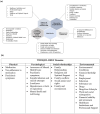Assessing quality of life and readmission rates among women in psychiatric care: a mixed-method study
- PMID: 40211425
- PMCID: PMC11983974
- DOI: 10.1186/s40359-025-02687-z
Assessing quality of life and readmission rates among women in psychiatric care: a mixed-method study
Abstract
Background: The mental health of women is significantly shaped by gender-related issues stemming from social and cultural disparities, which intensify female susceptibility and culminate in mental disorders. Despite a plethora of studies delineating the effects of gender on mental health, there exists a conspicuous deficiency in research investigating women's viewpoints regarding their own experiences of rehospitalization. Therefore, the principal aim of our investigation was to assess the relationship between rehospitalization and the Quality of Life (QoL) among women undergoing treatment at a psychiatric care institution.
Methods: We employed a mixed-methods research framework to examine the QoL and the variables pertinent to the readmission of twenty women from a public psychiatric hospital situated in the interior region of Espírito Santo, Brazil. The quantitative aspect evaluated QoL using the scores and analytical guidelines established by the World Health Organization Quality of Life Brief Version (WHOQOL-BREF) questionnaire. The results from this phase were subjected to descriptive statistical analysis. The qualitative data were derived from semi-structured interviews aimed at exploring the factors associated with readmission; the insights obtained underwent narrative analysis. This study was approved by the ethics committee. The interviews were only carried out after the patients were medically discharged.
Results: Women who are readmitted do not have their problems viewed objectively and, consequently, are not having them resolved, as the factors contributing to the mental health of these patients are complex and span across the domains of physical, psychological, social relationships, and environment. There is a notably low overall QoL (M = 47.78) in the study population, with particularly poor scores in the environment (44.49), psychological (47.71) and social relationships (48.54) domains. These findings align with participants' testimonies, which emphasize the role of unstable living conditions, financial insecurity, social isolation, and family dysfunction in their ongoing struggles with mental health.
Conclusions: The mental health outcomes of women are shaped by a multitude of factors, encompassing social support, access to resources, and individual coping strategies. Approaches to mental health care that are humanized and that address these factors are imperative for enhancing QoL and mitigating readmission rates.
Keywords: Brazil; Patient outcomes; Psychiatric care; Quality of life; Readmission rates; Women.
© 2025. The Author(s).
Conflict of interest statement
Declarations. Ethics approval and consent to participate: The study was approved by the Research Ethics Committee with Human Subjects at the Escola de Ensino Superior de Ciências da Santa Casa de Misericórdia de Vitória – EMESCAM, Espírito Santo, Brazil, study under Certificate of Presentation for Ethical Consideration protocol number 57700422.7.0000.5065. The participants signed the free and informed consent form. Consent for publication: Not applicable. Competing interests: The authors declare no competing interests.
Figures


References
-
- Brazilian Institute of Geography and Statistics -IBGE. Quantidade de homens e mulheres. 2022. https://educa.ibge.gov.br/jovens/conheca-o-brasil/populacao/18320-quanti.... Accessed 29 may 2024.
-
- World Health Organization. Mental health. https://www.who.int/news-room/fact-sheets/detail/mental-health-strengthe... (2022). Accessed 17 apr. 2024.
-
- Struja T, Koch D, Haubitz S, Mueller B, Schuetz P, Siepmann T. QoL after hospitalization predicts one-year readmission risk in a large Swiss cohort of medical in-patients. Qual Life Res. 2021. 10.1007/s11136-021-02867-5. - PubMed
-
- Shadmi E, Gelkopf M, Garber-Epstein P, Baloush-Kleinman V, Doudai R, Roe D. Routine patient reported outcomes as predictors of psychiatric rehospitalization. Schizophr Res. 2018; doi: 10.1016/j.schres.2017.04.049. 4Souza ASR, Souza GF de A, Praciano G de AF. Women’s mental health in times of COVID-19. BJMCH. 2020; 10.1590/1806-93042020000300001 - PubMed
MeSH terms
LinkOut - more resources
Full Text Sources
Medical

